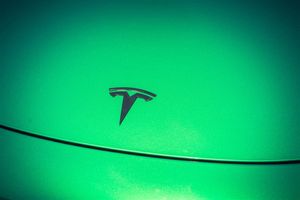
As October 2025 draws to a close, the technology sector continues its remarkable streak of outperforming the broader market, a trend that has not only persisted but intensified throughout the year. This sustained dominance is largely attributed to a confluence of groundbreaking innovation, particularly in artificial intelligence, robust earnings growth, and powerful market trends that have recalibrated investor expectations. The immediate significance of this phenomenon lies in an unprecedented market concentration, with a select group of tech giants driving global market performance to new heights, while simultaneously sparking discussions about market valuations and the sustainability of this growth.
The "AI Gold Rush" remains the undisputed primary catalyst, fundamentally reshaping economic landscapes and drawing immense, unprecedented investments into digital infrastructure. Companies are rapidly monetizing AI capabilities, most notably through their expansive cloud services, with the global AI market projected to reach approximately $391 billion in 2025 and expected to quintuple over the next five years. This insatiable demand for AI-driven solutions fuels investment across the entire ecosystem, from chip manufacturers to software developers and cloud service providers.
The Engines of Outperformance: Innovation, Trends, and Strategic Investments
The core of technology's outperformance stems from several key drivers. At the forefront is the Artificial Intelligence (AI) Revolution. AI isn't just an emerging technology; it's a pervasive force driving innovation across all sectors. This revolution has led to an explosive demand for Advanced Semiconductors, with companies like NVIDIA (NASDAQ: NVDA) maintaining a dominant market share (75-90%) in the AI chip segment. NVIDIA's meteoric rise, culminating in an unprecedented $5 trillion market capitalization as of October 29, 2025, underscores the critical need for Graphics Processing Units (GPUs) that power AI. Other chipmakers, such as Advanced Micro Devices (NASDAQ: AMD), are also experiencing accelerated revenue in their data center businesses due to this AI-driven demand.
Complementing this, Pervasive Cloud Computing remains central to technological strategies. Giants like Microsoft (NASDAQ: MSFT) with Azure, Amazon (NASDAQ: AMZN) with AWS, and Alphabet (NASDAQ: GOOGL) with Google Cloud are reporting significant growth in cloud revenue, directly fueled by the increasing demand for AI solutions and the scaling of specialized hardware for data-intensive tasks. Beyond core AI, other emerging technologies like green technology (bolstered by AI, IoT, and blockchain) and quantum computing are generating excitement, hinting at future growth drivers. These innovations collectively represent a significant departure from previous tech cycles, where growth was often more distributed and less concentrated around a single, transformative technology like generative AI. Initial reactions from the AI research community and industry experts, while overwhelmingly positive about the advancements, also include caution regarding potential "AI bubbles" and the need for rigorous ethical frameworks as these technologies mature.
Prevailing market trends further solidify tech's position. The "Magnificent Seven"—Alphabet (NASDAQ: GOOGL), Amazon (NASDAQ: AMZN), Apple (NASDAQ: AAPL), Meta Platforms (NASDAQ: META), Microsoft (NASDAQ: MSFT), NVIDIA (NASDAQ: NVDA), and Tesla (NASDAQ: TSLA)—are characterized by exceptional financial health, robust earnings, consistent revenue growth, and healthy balance sheets. Their global reach allows them to tap into diverse markets, while their continuous development of new products and services drives consumer demand and business growth. The ongoing global digitization and increasing automation across industries provide an expanding addressable market for technology companies, further fueling demand for AI, automation, and data analytics solutions. This sustained earnings growth, with the Magnificent Seven's earnings projected to expand by 21% in 2025, significantly outpaces the broader S&P 500, making these companies highly attractive to growth-oriented and momentum investors.
Corporate Beneficiaries and Competitive Implications
The current tech boom disproportionately benefits the aforementioned "Magnificent Seven." These companies are not merely participants but are actively shaping the AI landscape, investing heavily in research and development, and integrating AI into their core product offerings. Microsoft (NASDAQ: MSFT), for instance, has leveraged its partnership with OpenAI to infuse generative AI capabilities across its enterprise software suite, from Microsoft 365 to Azure, creating new revenue streams and strengthening its competitive moat against rivals. Amazon (NASDAQ: AMZN) continues to expand AWS's AI services, offering a comprehensive platform for businesses to build and deploy AI models. Alphabet (NASDAQ: GOOGL) is pushing advancements in large language models and AI infrastructure through Google Cloud and its various AI research divisions.
NVIDIA (NASDAQ: NVDA) stands as a prime example of a company directly benefiting from the "picks and shovels" aspect of the AI gold rush, providing the essential hardware that powers AI development. Its dominance in the GPU market for AI computation has translated into unparalleled market capitalization growth. Apple (NASDAQ: AAPL), while perhaps less overtly AI-centric in its public messaging, is deeply integrating AI into its device ecosystem for enhanced user experience, security, and computational photography, maintaining its premium market positioning. Meta Platforms (NASDAQ: META) is investing heavily in AI for its social media platforms, content recommendation, and its ambitious metaverse initiatives. Tesla (NASDAQ: TSLA) is a leader in applying AI to autonomous driving and robotics, positioning itself at the forefront of the intelligent vehicle and automation sectors.
The competitive implications for major AI labs and tech companies are profound. Smaller AI startups are often acquired by these giants or must differentiate themselves with highly specialized solutions. Companies that fail to rapidly adopt and integrate AI face significant disruption to existing products and services, risking obsolescence. This environment fosters an intense race for AI talent and intellectual property, with strategic acquisitions and partnerships becoming crucial for maintaining market positioning and strategic advantages. The sheer scale of investment and infrastructure required to compete at the highest levels of AI development creates significant barriers to entry, further consolidating power among the established tech giants.
Wider Significance and Societal Impact
The sustained dominance of technology stocks, particularly the mega-cap players, has significant wider implications for the global economy and society. This phenomenon is a stark reflection of the ongoing, accelerating digital transformation across all industries. AI is not just a technological trend; it's becoming a fundamental utility, akin to electricity, driving efficiency, innovation, and new business models across sectors from healthcare to finance and manufacturing. The unprecedented market concentration, with the Magnificent Seven constituting nearly a record 37% of the S&P 500's total market capitalization as of October 21, 2025, means that the performance of these few companies heavily dictates the overall market direction, pushing the S&P 500 to new record highs.
However, this concentration also brings potential concerns. Valuation concerns persist, with some analysts warning of "AI bubbles" reminiscent of the dot-com era. Should these companies fail to meet their lofty growth expectations, significant stock price corrections could ensue, impacting broader market stability. Regulatory scrutiny is also intensifying globally, as governments grapple with issues of market power, data privacy, and the ethical implications of advanced AI. Geopolitical tensions, such as ongoing trade wars and supply chain disruptions, also pose risks, particularly for a sector as globally interconnected as technology.
Comparisons to previous AI milestones and breakthroughs highlight the current era's unique characteristics. While earlier AI advancements focused on specific tasks or narrow applications, today's generative AI demonstrates remarkable versatility and creative capabilities, hinting at a more profound and widespread societal transformation. This era is marked by the rapid commercialization and integration of AI into everyday life, moving beyond academic research labs into consumer products and enterprise solutions at an unprecedented pace. The impacts are vast, from job displacement concerns due to automation to the potential for AI to solve some of humanity's most pressing challenges.
The Road Ahead: Future Developments and Emerging Challenges
Looking ahead, the trajectory of technology stocks will continue to be shaped by ongoing advancements in AI and its adjacent fields. In the near term, we can expect continued refinement and expansion of generative AI models, leading to more sophisticated applications in content creation, personalized experiences, and scientific discovery. The "broadening rally" observed in late 2024 and throughout 2025, where earnings growth for small and mid-cap technology stocks is projected to accelerate, suggests that AI's impact is spreading beyond the mega-caps, creating new opportunities in specialized semiconductors, applied AI, and green technology.
Longer term, the horizon includes significant developments in Quantum Computing, which, while still in its nascent stages, promises to revolutionize computational power for complex problems currently intractable for even the most powerful supercomputers. The integration of AI with advanced robotics, biotechnology, and material science will unlock entirely new industries and capabilities. Potential applications are vast, ranging from personalized medicine and climate modeling to fully autonomous systems and hyper-efficient manufacturing.
However, challenges abound. The ethical implications of increasingly powerful AI, including bias, privacy, and accountability, require robust regulatory frameworks and industry best practices. The energy demands of large-scale AI models are also a growing concern, necessitating innovations in energy-efficient hardware and sustainable computing. Geopolitical competition for AI leadership and control over critical semiconductor supply chains will continue to be a significant factor. Experts predict that the market will become increasingly selective, favoring companies that not only innovate but also demonstrate clear pathways to profitable monetization and responsible development. The ability to navigate these technical, ethical, and geopolitical challenges will define the next wave of tech leadership.
A Defining Era for Technology and Investment
In summary, the continued dominance of technology stocks is a defining feature of the current market landscape, driven primarily by the relentless innovation of artificial intelligence, robust financial performance of leading tech companies, and powerful market trends favoring digitization and automation. The "Magnificent Seven" have played an outsized role, their strategic investments and market positioning cementing their leadership. This era is characterized by unprecedented market concentration, strong earnings growth, and a pervasive "AI Gold Rush" that is reshaping industries globally.
This development marks a significant chapter in AI history, showcasing the rapid transition of advanced research into commercially viable products and services. The long-term impact is likely to be transformative, fundamentally altering how we work, live, and interact with technology. While concerns regarding valuations, market concentration, and ethical considerations persist, the underlying technological advancements suggest a continued period of innovation and growth. Investors and policymakers alike should closely watch for evolving regulatory landscapes, the emergence of new AI-driven sub-sectors, and how companies address the societal challenges posed by increasingly powerful AI. The coming weeks and months will undoubtedly bring further insights into the sustainability and direction of this extraordinary tech-led market rally.
This content is intended for informational purposes only and represents analysis of current AI developments.
TokenRing AI delivers enterprise-grade solutions for multi-agent AI workflow orchestration, AI-powered development tools, and seamless remote collaboration platforms.
For more information, visit https://www.tokenring.ai/.






